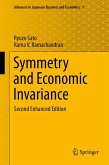As a text book or reference book for those students who are studying microeconomics for the first time, the author recommends the use of Chapter 1, Chapter 2 (except section 9), Chapter 3 (from section 1 to section 3, section 6, section 11), Chapter 4 (from section 1 to section 4), Chapter 5 (from section 1 to section 5, section 8), Chapter 6 (except sections 6 and 7), Chapter 7 (from section 1 to section 5), Chapter 8 (from section 1 to section 6) and Chapter 9 (sections 1, 4 and 7). For more advanced readers, the author recommends the remaining sections and the literature recommended in the last part of each chapter. Problems given at the end of each chapter allow readers to confirm understanding of the content of the chapter and suggest to the readers more advanced studies. Incidentally, the author tried to avoid the use of the advanced mathematics. Only elementary knowledge of differential calculus and linear algebra are required to read this book.
Dieser Download kann aus rechtlichen Gründen nur mit Rechnungsadresse in A, B, BG, CY, CZ, D, DK, EW, E, FIN, F, GR, HR, H, IRL, I, LT, L, LR, M, NL, PL, P, R, S, SLO, SK ausgeliefert werden.









